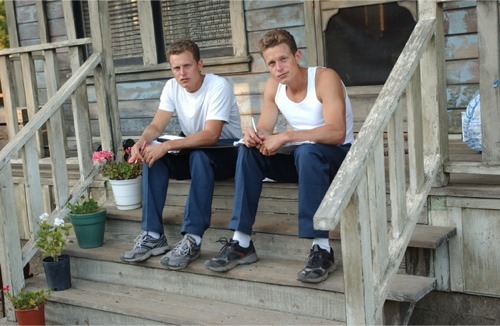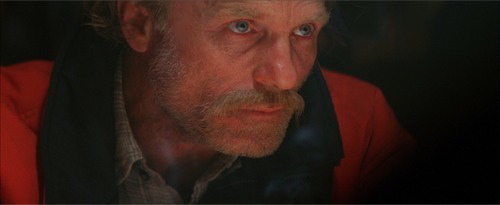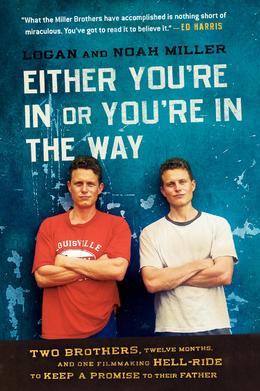Touching Home is a superior independent film that will certainly win your hearts. A lot of projects are called labors of love, but this one really is. Logan and Noah Miller put everything on the line to produce, direct and -- in a move that many might have thought insane -- play the lead roles, Clint and Lane Winston. Although officially proffered as a fictional narrative, the Millers, identical twins, are essentially playing themselves. The movie is a revelatory gem about their ambivalent but never loveless relationship with their father, played by Ed Harris, one of the finest actors around. Touching Home is a hard-edged, tough, yet beautiful film.

The twins -- baseball players in their twenties, their sights set on profession contracts -- know how important it is for them to stick together. Clint says, "We're blessed, Lane. We've got each other. Always remember that." Yet sometimes that's more easily said than done, and it takes the boys a long time to realize how true that really is.
The game of baseball is probably a better symbol of the American Dream than any other sport because, although it is a team endeavor, the focus most of the time is on one player: the pitcher throws that third strike, or he doesn't; the batter hits that line drive, or he doesn't; the shortstop fields that one-hopper in the hole, or he doesn't. And that's America at its best: individuals playing as individuals for the benefit of the team; individuals in all walks of life working as individuals for the benefit of the whole society.
Every person is important. Each woman and each man matters, even a drunk who dies destitute, which is what tragically happens to the boys' father, Charlie. (Don't worry, I didn't spoil anything. We see Clint and Lane scattering their dad's ashes in the first scene.) Charlie might not have led the perfect life, as he is quick to admit, but his life still has meaning. That's the philosophy that comes through every frame of Touching Home. Think of the connotations inherent in that title. The goal in baseball is to touch home plate, and an important goal in life is being in touch with our real home, our family and our loved ones. Charlie says that home is the place where you feel safe, where it's quiet, where you can get away from all the noise.

Robert Frost wrote, "Home is the place where, when you have to go there, they have to take you in." Well, I think the Miller brothers might want to add, "Home is keeping the people you love close to your heart, even if they're in a place where you don't necessarily want to go." In the film, a clear symbol of this is a beautiful, elaborately carved wooden box that apparently was made by Charlie and is inherited by his sons. This is a special item. It's one of the first things we see in the film, and it's a reminder that Charlie is always in Clint and Lane's world even though he may be in an unreachable place.
Charlie's problem is alcohol abuse. When we first meet him, early in the film, his sons are still in Little League. He arrives home late at night, drunk, and finds a baseball trophy one of his sons had left on the coffee table for him to see. He picks up the trophy, fights back tears, and then in a moment of supreme frustration and raging guilt, he hurls it against the wall and breaks it. Then, in a sad metaphor for his entire life, he tries to glue back the broken piece and make the trophy whole again, but he fails.
 How Logan and Noah Miller, unknowns to the Hollywood elite, were able to snare as big a star as Ed Harris makes for a funny and touching story of its own, which the Millers relate in their book about the making of the film, Either You're In or You're In the Way. I suppose a lifetime of being a twin prepares one (or should I say two?) to be a master at self-deprecating humor, and these fellows take full advantage of this gift. What I love about both the book and the movie is that these guys made the most out of what they had and what they could beguile out of others. People always say, if you want it bad enough, you can achieve it. Well, the Miller brothers did just that and it's inspiring to witness it.
How Logan and Noah Miller, unknowns to the Hollywood elite, were able to snare as big a star as Ed Harris makes for a funny and touching story of its own, which the Millers relate in their book about the making of the film, Either You're In or You're In the Way. I suppose a lifetime of being a twin prepares one (or should I say two?) to be a master at self-deprecating humor, and these fellows take full advantage of this gift. What I love about both the book and the movie is that these guys made the most out of what they had and what they could beguile out of others. People always say, if you want it bad enough, you can achieve it. Well, the Miller brothers did just that and it's inspiring to witness it.
There is nothing more iconic in America than a boy playing catch with his dad. In one of the book's most memorable passages, Ed Harris walks out of the makeup trailer onto a baseball field and presents himself to the Miller brothers and the rest of the crew for the first time in character as the boys' father. The Millers are astonished; they feel as if they are seeing their father's ghost walking toward them wanting to help them with their game. Harris, in his typical modest way, asks, "How do I look, boys? Do I look like him?" This passage would bring a tear to the most jaded eye. And the emotional power of all of this was caught by the camera and can be witnessed on the movie screen.
Great tragedies make for great stories which make for great films. The greatest tragedy of Charlie's life is expressed eloquently in the Millers' book: "Alcoholism steals the soul. Perhaps the most painful aspect is that it's a gradual theft... We feared we'd become like our dad, still do at times. He was a man of great talents who never got to realize them."
Can we have a movie about family without a boy-girl love story? Of course not, but the one between Lane and Rachel, the girl he wanted to date in high school but never cooked up the nerve to ask, is integrated tastefully and elegantly into the rest of the narrative. There are no sex scenes or cheesecake shots to detract from the movie's emotional center. Boy and girl connect on a mature level; they involve themselves in each other's worlds instead of living the fantasy of two young lovers creating their own world. While on a date, Lane and Rachel are walking down the street and they find Charlie literally down and out, sitting in the gutter. He is so plastered that he cannot find his truck. Lane turns to Rachel and asks her to wait for him until he can take care of the situation, but she won't have any of that. She insists upon going with them and being involved. This is the beginning of a real relationship, one that goes beyond moon and June. It is a beautifully written scene -- one among many in the excellent script.
Congratulations, Logan and Noah. You did it. You persevered and beat the odds. And the result is a wonderful film.
Q & A with the Miller Brothers
I was fortunate enough to speak with Logan and Noah Miller for several minutes via cell phone and ask them a few questions about their film. They were sitting in a park in Sacramento, CA, and were surrounded by squirrels. I did not record our conversation, so the brothers' answers are paraphrased.
Q: What really hooked Ed Harris on the project?
A: Ed was impressed by the passion we brought to it and by our commitment to tell our dad's story. He believed in what we were doing; he believed in the story we were telling. We also told Ed that he was our guy, that he was the only actor who could play the role. As Ed himself put it later, "I said yes because the boys wouldn't let me say no."
Q: Why did you decide to act in the film yourselves rather than hire established actors?
A: Originally, we didn't plan on acting. But when we started shooting some baseball scenes in Arizona to use as a trailer, we had just ourselves, a few crew members, and our credit cards. We knew that we wanted realistic baseball scenes. We didn't want actors who couldn't really play ball. Who else but us could play us as baseball players and make it look believable? So after making the trailer, we decided that we would prepare, prepare, prepare, and try to do the best job we possibly could.
Q: Did acting opposite Ed Harris and Brad Dourif, two consummate professionals, help you to be better actors?
A: Absolutely. From the beginning, we just wanted to be ourselves, to be true to who we were, and to immerse ourselves in the emotion. What Ed and Brad did was relax us; they made us more comfortable. Probably the best thing they did was to take away the make-believe factor and help us become more authentic.
Q: Touching Home was shown at several film festivals over the past year. How was the movie received?
A: We got very positive reactions. People came up to us after seeing the film, some of them with tears in their eyes, saying how moved they were. A few guys said it made them determined to contact their own fathers and get on the road to reconciliation, to reconnect and make peace before it was too late. And the movie picked up a few audience awards.
Q: What do you want the viewers to take away from the film?
A: We hope that in some way our movie helps others deal with similar issues in their families. We hope they see that our film is about love, forgiveness, and redemption. It's about reaching out and not giving up on people.